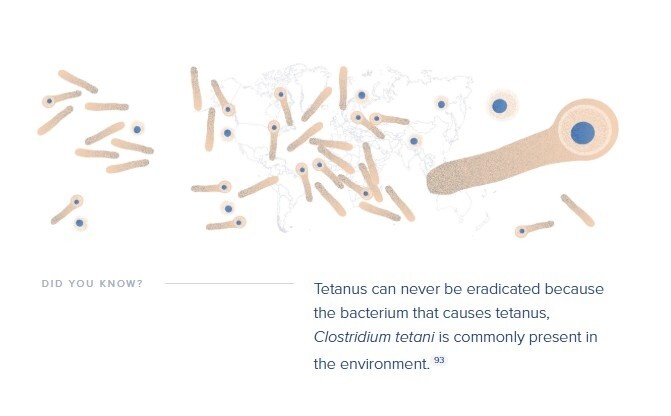August 18, 2025
What Is Tetanus? Symptoms, Risks & Why Travel Vaccination Matters

Tetanus might not be something we think about every day, but if you’re planning travel—especially to more remote or rural areas—it’s a condition you really shouldn’t overlook.
Let’s dive into what tetanus is, where the risks lie, and how vaccination can keep you protected.
🌍 What Is Tetanus?
Tetanus is a serious nervous system infection caused by a toxin released by the Clostridium tetani bacterium, which lives in soil, dust and animal waste.
Unlike many infections, tetanus isn't passed from person to person. It gets into the body through cuts, puncture wounds, burns or animal bites—especially if those injuries are contaminated with soil or rust.
💡 Did you know? Tetanus bacteria are everywhere in the environment—so while we can prevent the disease with vaccination, we can’t eradicate the bacteria that cause it.

🧠 What Are the Symptoms of Tetanus?
The symptoms typically appear 4–21 days after exposure (the shorter the incubation, the more severe the illness tends to be). Classic signs include:
Muscle stiffness, especially in the jaw (often called “lockjaw”)
Painful muscle spasms
Difficulty swallowing or breathing
Fever and sweating
High blood pressure and rapid heart rate
In severe cases, complications include pneumonia, broken bones from intense spasms, and even respiratory failure.
Tetanus can be fatal if left untreated.
✈️ Tetanus Risk and Travel
If you’re travelling to countries with limited medical facilities—or planning activities like hiking, camping or working outdoors—it’s important to make sure your tetanus vaccinations are up to date.
Even a small scratch from a fall or animal bite could be enough to introduce the tetanus toxin into your body.
High-risk situations include:
Rural travel in developing countries
Trekking or adventure sports
Working on farms or with animals
Emergency injury without immediate access to sterile medical care

💉 Tetanus Vaccination in the UK
In the UK, tetanus vaccination is part of the routine childhood immunisation schedule, delivered as a combination vaccine with protection against diphtheria, pertussis (whooping cough), polio and more.
| Vaccine | When Given | Suitable For |
|---|---|---|
| Infanrix®-Hexa | 2–3 doses from 2 months old + booster | Babies and young children |
| Vaxelis® | From 6 weeks old | Babies and children |
| Boostrix®-IPV / Repevax® | Booster dose (0.5ml) | From age 3, including in pregnancy |
| Revaxis® | Booster (0.5ml) | From age 6 onwards, for travel or injury |
All these vaccines include tetanus protection and may be given as booster doses before travel, especially if your last dose was over 10 years ago.
🌍 Travel and Tetanus: Who Needs a Booster?
✅ Not vaccinated or unsure?
Start your tetanus course as soon as possible. You need at least one dose before you go, with others completed later.
✅ Had the full 5-dose UK schedule?
You’re generally considered protected. But if you're travelling to an area with limited access to emergency healthcare, and it’s been 10+ years since your last booster, you may be advised to get a top-up dose.
🛡️ What To Do If You Get a Tetanus-Prone Wound While Travelling
Clean the wound thoroughly with clean water and soap if available.
Seek medical help as soon as possible—especially if your tetanus vaccination status is incomplete or unknown.
You may be given tetanus immunoglobulin if it’s a deep, dirty wound.

📞 Book Your Tetanus Booster at Ready Health
At Ready Health Clinic in Standish, we offer:
Same-day tetanus boosters
Travel health consultations
Combined vaccines for DTP, polio and more
Expert advice tailored to your travel plans
📍 Serving Wigan, Chorley, Horwich, Bolton and beyond
🕒 CQC-registered private medical clinic
📞 Call us today on 01257 676001 or book online
✅ Quick Tetanus Facts
| Fact | Details |
|---|---|
| Cause | Clostridium tetani bacterium |
| Spread | Contaminated wounds (not person-to-person) |
| Symptoms | Muscle spasms, jaw stiffness, breathing issues |
| Prevention | Vaccination and good wound care |
| Risk in Travel | High in rural or low-resource settings |
Related articles...
Dec 30, 2025
The Blood Tests Every Athlete Should Be Taking in 2026A clear guide to the most important blood tests...
Dec 23, 2025
Heart Disease - The Warning Signs Men Shouldn’t IgnoreA clear guide to the symptoms men should recognise...
Dec 22, 2025
Blood Tests for Early Illness Detection/ The Hidden Diseases Blood Tests Can UncoverA clear guide to the illnesses and health issues...